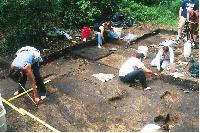 The 2012 archaeological field school is a cooperate effort between TC3 and IC. We will investigate Native American village sites dating from the 10th to 12th centuries and the origins of the Haudenosaunee (Iroquois) Confederacy.
The 2012 archaeological field school is a cooperate effort between TC3 and IC. We will investigate Native American village sites dating from the 10th to 12th centuries and the origins of the Haudenosaunee (Iroquois) Confederacy. 
Archaeologists have long maintained that the Confederacy was formed rather recently, either just before or after the arrival of Europeans (A.D. 1450-1650). The Haudenosaunee maintain that their confederacy is over 1,000 years old. Excavations at the Levanna site from 2007-2009 have found the first archaeological evidence of an early confederacy in the form of longhouse architecture, symbols on artifacts and smoking pipes.
The 2011 field season worked at a Cayuga farmstead site, Myers Farm, which produced evidence of local feasting and large-scale agriculture. This summer we will continue research at Myers Farm and other nearby Cayuga sites.
Students will learn archaeological field techniques, including excavation, special sample extraction, mapping, and documentation. Since 2000, my archaeological field schools (conducted through Ithaca College, TC3 and Wells College) have promoted a new vision in archaeology that has come to be known as “indigenous archaeology.” This is a collaborative archaeology that includes Native people and seeks to make archaeology a positive force for them, instead of the negative force it has too often been. Besides learning the fundamental methods of field archaeology, students will also learn about the political context of the research, including the Cayuga people, their land claim, problems, and progress. A series of speakers including Native leaders, Clan Mothers, and artisans will visit the site to discuss their perspectives on life, history, and archaeology. We will also visit various sites, museums, and landmarks of historic interest in the area. The goal is to have a multifaceted experience that places the excavations into their proper cultural context. Archaeology is then an active shaper of social values and not just the study of old items. This is a unique vision for an archaeological field school.
Hours:
Monday-Friday 9am - 4pm
There will also be breaks, visits to archaeological sites, museums, the SHARE Farm, and guest speakers.
Costs:
In-state (provide copy of certificate of NY residence):
Credits fee: $139/credit, 6 credits: $834
Technology fee (non-TC3 students): $14/credit : 84
Transcript fee:20
ID fee:10
________________________________________________________
Total: $948
Out-of-state
Credits fee: $288/credit, 6 credits: $1728
Technology fee (non-TC3 students): $14/credit: 84
Transcript fee:20
ID fee: 10
_________________________________________________________
Total:$1842
Housing:
Some students are commuting. Students in need of housing may stay in the Ithaca College dormitories at additional cost.
Transportation:
We will be organizing car pools for transportation to the site.
How to enroll:
TC3 students enroll through the TC3 website (www.tc3.edu). Click on A-Z and go to R (registration). There are step-by-step instructions on registration from there. The course is listed as ANTH 274 (Archaeological Field School). In state students need a certificate of residence from their home county to get in-state tuition. IC students may enroll at the TC3 office on the Ithaca Commons (6th floor, 118 N.Tioga St.). All students may obtain a statement of my permission to take the course, which will save you the task of providing a transcript to prove prerequisites.
Contact:
Please get in touch with any questions or comments.
Jack Rossen, Associate Professor & Chair
Department of Anthropology, Ithaca College, Ithaca, NY 14850
jrossen@ithaca.edu, 607-274-3326 office
https://www.ithaca.edu/intercom/article.php/20120425103927833